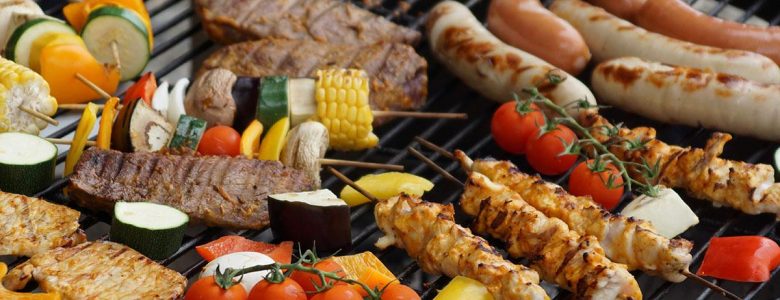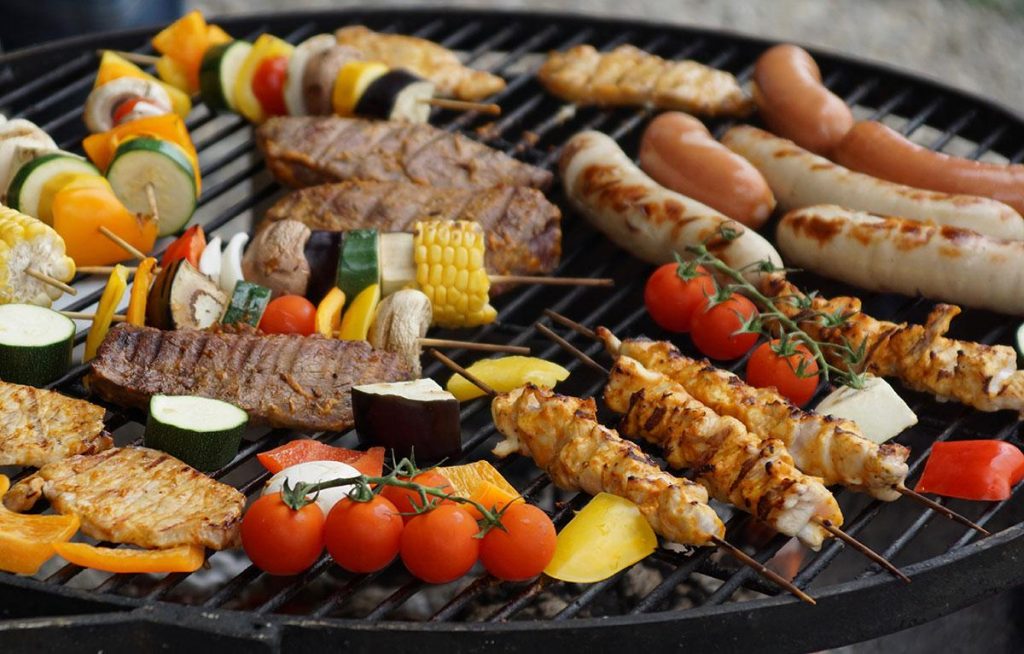April 23, 2020
Kissed by Flame: A Basic BBQ Guide by Darren Wayland

A variety of skewered meats and veggies cooking on a grill
Source: BBQ Host
Darren Wayland of BBQ Host teaches us the basics of mastering the barbecue.
New to the world of grilling? If you’re looking to enjoy some fabulous grilled meats and veggies, we’re always eager to lend a helping hand. Here’s a basic guide on how to get the very best BBQ results the first time and every time.
Things to Remember
- No matter what fuel source you use, you’ll have to preheat the grill for at least a few minutes before you start to cook. This will allow the grates to get nice and hot, giving you those all-important grill marks.
- Grilled foods will continue to cook slightly once they’re removed from the heat.
- A meat thermometer is an invaluable tool when it comes to grilling, especially for first-timers.
- Set up your grill on stable, even ground, and try to keep it out of the wind.
How to BBQ: A Step-by-Step Guide
- Choose your grill type. While gas grills provide instant gratification, a charcoal-fired unit will give your food a more authentic taste. Pellet smokers, meanwhile, will also impart excellent flavors but are more complicated to master.
- Follow the instructions for setup and first-time use. Make sure the grates are clean and lightly oiled before adding any food.
- Build a fire or set the temperature depending on what type of food you’ll be cooking. For indirect cooking, a gas grill should be set to “Low,” while a charcoal fire should be allowed to die down until you can hold your hand three to four inches above the coals for about eight seconds without having to move it.
If you’re using a charcoal grill for a slow-cooking method (say, for smoked pork butt or ribs), move all the coals to one side and place the meat over the side that’s free of coals. For this technique, the lid should always remain closed during cooking, no matter what fuel source you’re using.
For burgers or hot dogs, set a gas grill to “Medium” or “High.” A charcoal fire is medium-hot when you can hold your hand three to four inches above the coals for just two to three seconds before it gets too hot.
- Prepare your ingredients while the grill is heating. If your meats have been placed in a marinade, remove them and blot the meat dry with paper towels.
Vegetables should be washed and thoroughly dried before being seasoned for the grill. Usually, a light coating of extra-virgin olive oil and a sprinkle of salt and pepper are all that’s needed. Additional seasonings and sauces can be added after cooking.
- Place your prepared ingredients on the grilling grate and cook according to the recipe. Make sure you’re not using the same utensils for both raw and cooked meats. Similarly, use a clean plate when removing the meat from the grill for the resting period.
- Try not to flip meat more than once during the cooking process. This will help seal in the juices.
- If you’re using a sugar-based sauce (such as barbecue), brush it on during the last few minutes of cooking. Otherwise, the sugars will burn, giving your meat a bitter and unpleasant taste.
- Test the meat for completeness using your thermometer. Make sure to insert the probe into the thickest portion of the meat, away from any bones.
Pork and fish should be cooked to 145 degrees Fahrenheit, while poultry should hit the 165-degree mark. Beef, meanwhile, can range from 140 degrees for rare to 170 degrees for well done.
Since the meat will continue to cook slightly as it rests, you can remove it when it’s within 5 degrees of the temperatures listed.
- Remove cooked meat from the grill and tent loosely with aluminum foil for five to 10 minutes. Grilled vegetables and flatbreads can be served immediately. If your meal has several grilled components, try to add them in the appropriate stages so that everything will be ready to eat at once.
- Add any additional sauces or seasonings as you see fit.
Enjoy!
Read the full guide to mastering the grill on BBQ Host!
Head on over to the BBQ Host blog to learn more about barbecue cooking.
Interested in having content featured in an upcoming blog post or issue of The Burgundy Zine? Head on over to the submissions page!
For all other inquiries, please fulfill a contact form.
This entry was posted in 2020, Spring 2020, April 2020, Contributors, Blog, Food, Blog, Guest Content, Hot Stuff, Blog, How To and tagged in april 2020, barbecue host, barbecue host darren Wayland, barbecue tutorial, bbq advice, bbq guide, bbq host, bbq host darren Wayland, bbq host guide, bbq host the burgundy zine, bbq how to, bbq tutorial, burgundy zine, burgundyzine, burgundyzine.com, chef, cook, cooking, cooking advice, cooking guide, cooking how to, cooking tutorial, culinary art, culinary arts, darren, darren Wayland, darren Wayland the burgundy zine, food, food blog, guest blog, guest content, guest post, guest writer, guide, guides, hot stuff, how to, how to barbecue, how to barbecue meat, how to barbecue vegetables, how to bbq, how to cook barbecue, how to cook bbq, how to cook on a barbecue, how to cook on a bbq, how to grill, how to grill meat, how to grill vegetables, how to use a bbq, Kissed by Flame: A Basic BBQ Guide by Darren Wayland, open writing submissions, submit your blog, submit your post, submit your writing, the burgundy zine, tutorial, tutorials, Wayland, writing submission, writing submissions.
Guest Content
Guest Content is the user to denote any and all articles submitted to us by fellow writers. More content submitted to us by guest contributors can be found under our "Guest Content" section. If you are interested in submitting content to The Burgundy Zine, please refer to our submissions page.
View more posts from this author
